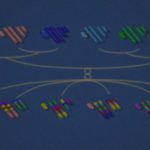Lien vers Pubmed [PMID] – 9157514
Rev Prat 1997 Jan; 47(2): 162-8
A large number of genetic diseases are found both in humans and in one or several animal species. The mouse is a species of choice since, in addition to hundreds of spontaneous mutations which have been described, it is now possible to produce at will a mutation in any gene. This strategy has been used to generate genetically engineered mice which carry genetic defects found in human molecular pathology. Animal models are an invaluable tool to study the pathophysiology of diseases and to test new therapies. However, they are rarely exact replicates of the human disease. Possible origins for these differences are discussed in detail.

